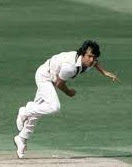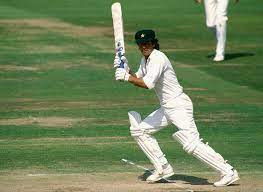By Syed Khalid Mahmood
(Pakistan News & Features Services)
readmore »»
Besides being acclaimed as one of the greatest-ever cricketers to be produced by Pakistan, Imran Khan also belonged to the category of the fastest bowlers of the world who succeeded in taming even the most solid batsmen of the generation with his ferocious pace which was combined most skillfully with extravagant swing.
He himself was an outstanding batsman, technically correct with sound temperament, to be recognized as one of the rare genuine all-rounders of the game. Despite career-threatening injuries, he outperformed even his three illustrious contemporaries; Ian Botham, Richard Hadlee and Kapil Dev, with his incredible consistency throughout the 1980s in particular.
Long before the advent of speed guns, which have now become common in modern television coverage, Imran had sent down the third fastest delivery in a competition of fast bowlers held in Australia in 1979. Only Jeff Thomson and Michael Holding had delivered faster balls than Imran with the dreadful names like Colin Croft, Andy Roberts, Dennis Lillee, Len Pascoe, Wayne Daniel and Garth Le Roux falling behind.
Unlike quite a few of his fast bowling contemporaries, who became infamous for attacking the batsmen’s body, Imran was hardly ever engaged in any such act. Despite being blessed with red-hot pace, he concentrated in getting the batsmen out instead of terrifying or terrorizing them.
Although the fast bowlers of his era were known and feared for being blood-hungry, he was able to focus solely on his own skill set to outsmart the batsmen. His approach to the bowling crease was athletic and his bowling action a treat to watch, besides being unique and different from others.
Unlike others, Imran never appeared inclined towards causing harm to the batsmen or hurting them physically. A few batsmen, most famously Mohinder Amarnath, did succumb to one his bouncers at Lahore during the 1978-79 series, but that was basically attributed to their own faults and misjudgment of balls.
His reverse-swinging yorkers and in-dippers brought him the bulk of his wickets with dignity and pride. He swung the ball prodigiously at express pace to bring about the demise of the greatest of batsmen.
His devastating spells during the post-tea sessions in Test matches at the National Stadium, Karachi, when sea breeze used to pick up, remained unforgettable. The sight of India’s ‘Little Master’ Gundappa Vishwanath shouldering arms to a delivery swinging in almost a yard to castle him would cling to memory of everyone who was fortunate enough to witness that terrific spell of Imran which literally blew what was deemed to be a batting powerhouse.
Imran always advocated for fair play and justice throughout his long international career spanning more than a couple of decades. He was the man who convinced the country’s cricket administrators to take up the case of neutral umpires with the game’s governing body (ICC) and he was captaining Pakistan’s team in the home series against the West Indies in 1986-87 which was supervised by the third-country umpires for the first time in the history of the game.
As a captain, he was dominating, disciplined and decisive, yet sporting. During the 1989-90 home series, the visiting Indian captain, Krishnamachari Srikkanth, appeared dismayed at being given out by the umpire. The dashing opener, undergoing a lean patch with the bat, openly showed his displeasure and disgust when leaving the crease. Imran, after consulting the umpires, called him back and he was allowed to resume his innings. Such kind of instances could rarely be found in the Indo-Pak matches where emotions run so high.
Despite commanding the respect from his teammates as he led the side by example, Imran generally didn’t argue with the umpires and he was hardly ever involved in controversies on the field. He was not into sledging the opponents either. In fact, more often than not, he calmed his boys and let them focus on their job which was to overpower the opponents and not to create unruly scenes.
It’s also a reality that, as a captain, he had a decisive say in selection matters much more than usual and the selectors were sometimes overruled. He had the knack of picking his team for which he had set his own parameters. He preferred bold and courageous cricketers who could play for win. He dared taking risks which often yielded results. His preference was based on sheer merit devoid of any regional or provincial bias. He was an open admirer of wicketkeeper-batsman Saleem Yousuf because of his brave instincts.
Off the field, he was hardly ever observed in any politicking or violating discipline anywhere. Possessing a shy nature, he didn’t like to mingle with his teammates after office hours. It was indeed his prerogative to lead social life of his own choice.
Imran has been a success story in cricket all the way. Besides the glowing figures and statistics, there’s ample evidence of him having left larger than life footprints. His sporting nature has been talked about with awe.
His resilience was second to none. He was known never to have deviated from the widely accepted ethics and principles of the civilized world. One can safely conclude that he was as much a great person as a highly respected and honoured cricketer to be hailed as an undisputed legend in his own lifetime.










